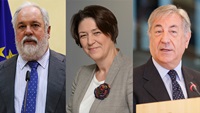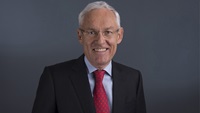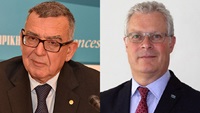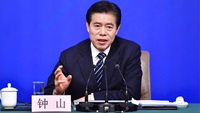Top 10 in regulation 2018
In 2018, regulators, politicians, lobbying and pressure groups were more important and influential in the shipping industry than at any other time in recent memory. New and upcoming environmental rules, in particular, clearly dominated the industry's priorities and concerns, while trade tariffs and sanctions have complicated matters even further
As part of our annual Top 100 most influential people in shipping series, we reveal how, in a year where there was no shortage of controversy around maritime regulation and trade, these 10 players shaped the rules the most
01 / Kitack Lim, secretary-general, International Maritime Organization
THE International Maritime Organization was the shipping industry's biggest influencer in 2018, let alone the most consequential regulator.
The organisation agreed to a landmark strategy to curb shipping’s greenhouse gas emissions by at least 50% by 2050, putting the whole sector on a clear decarbonisation course that will fundamentally affect maritime technology, fuels and finance for the foreseeable future.
The IMO’s 2020 sulphur cap, which will have massive financial and operational implications in the near future, has been the single largest concern and point of reference for the industry in 2018.
The IMO did its best to tighten up implementation, adopting a carriage ban of non-compliant fuels and quashing any potential for a phase-in of the new rules.
 02 / Miguel Arias Cañete, Violeta Bulc and Karmenu Vella, European Commission
02 / Miguel Arias Cañete, Violeta Bulc and Karmenu Vella, European Commission
HAVING postponed a possible introduction of regional emission rules until 2023, the European Commission was nonetheless instrumental in exerting pressure on the IMO for ambitious GHG emissions reduction goals, co-ordinating an EU-wide stance during most environmental negotiations throughout the year.
The commission’s reach was pivotal in countering forces in the IMO that wanted lower and, in some cases, even no firm emission reduction targets at all.
Its presence is likely to become only more prevalent as climate negotiations become even more political.
Its challenge will be holding member states to that EU line, as financial implications of environmental regulation become more acute.
 03 / Esben Poulsson, chairman, International Chamber of Shipping
03 / Esben Poulsson, chairman, International Chamber of Shipping
THE International Chamber of Shipping, like most shipowner associations, had one of its busiest and impactful years in 2018.
In the departing year of Peter Hinchliffe, who headed the association as secretary-general for eight years until August, ICS co-led a successful effort to ban non-compliant fuels in 2020, to strengthen the IMO sulphur cap and vocally represented shipowners in the greenhouse gas debate, which yielded targets close to the ones originally envisaged by the associations.
The chairman and the new secretary-general have taken initiatives to prepare owners for the sulphur cap with new guidance and have sought to safeguard against potential fuel issues by proposing greater legal oversight over bunker suppliers.
 04 / Anastasios Papagiannopoulos, president and Angus Frew, secretary-general and chief executive, BIMCO
04 / Anastasios Papagiannopoulos, president and Angus Frew, secretary-general and chief executive, BIMCO
BIMCO has been at the forefront of industry’s participation in environmental negotiations and regulation this year.
The organisation was also part of the industry initiative for the 2020 fuel carriage ban and saw a greenhouse gas strategy that resembled what its members originally sought.
It also began developing legal clauses, which it expects to become the industry’s standard, on the responsibilities and obligations of charterers and owners ahead of 2020.
After supporting a contentious ‘experience-building phase’ proposal for the sulphur cap, BIMCO secured IMO’s call for proposals on data collection and analysis that could shine some light on the cap’s expected shortcomings.
 05 / Lee Jeong-kie, chairman, International Association of Classification Societies
05 / Lee Jeong-kie, chairman, International Association of Classification Societies
THE International Association of Classification Societies underwent important internal changes and made significant external contributions to regulations during this past year.
As the leading technical expert body in the IMO, the IACS was heavily involved in discussions around preparations for the sulphur cap, a role that will only grow and may push it into an uncomfortable position due to its dislike of being engulfed in political debate.
Mr Lee took over in July, inheriting a heavy workload from his predecessor, Knut Ørbeck-Nilssen. The association is on a trajectory of change, having launched several new initiatives, including new criteria for maintaining and getting IACS membership.
 06 / Mike Pompeo, secretary, United States Department of State
06 / Mike Pompeo, secretary, United States Department of State
THE Trump administration initiated a trade war, renegotiated existing trade deals and re-introduced sanctions on Iran in 2018.
All these decisions added to the growing portfolio of uncertainty-inducing factors that shipping is currently trying to manage.
With US tariffs announced to date on $250bn of Chinese goods and on steel imports, among others, there were the inevitable retaliatory moves from China.
The impacts may be stronger in 2019 and beyond, but for an industry that largely feels it is being squeezed by environmental regulation, policies that potentially undermine trade flows will be the last thing they want to see.
 07 / Zhong Shan, minister of commerce, China
07 / Zhong Shan, minister of commerce, China
THE US trade policies prompted reciprocal measures — not least from China — that have already had demonstrable implications for the shipping industry.
A 25% tariff on US soyabean imports has already affected dry bulk markets. Tariffs on another $60bn of goods may lead to further trade alterations in the shipping market.
While Mr Shan has kept busy with trade, the ministry also cleared Cosco Shipping’s high-profile OOIL takeover earlier in 2018.
08 / CO2 lobby
2018 was no doubt the environmentalist’s year in shipping. The CO2 lobby, comprising organisations, politicians and civic activists, was the leading orchestrator of scrutiny and public pressure on the industry and on the IMO to commit to slashing emissions. It has, over the years, helped sway the tide within industry ranks.
The lobby’s success has been apparent in a multitude of ways, both through IMO decisions but also beyond pure regulatory terms. A public commitment made in October by leading shipping companies in support of the IMO’s GHG strategy signalled a new corporate attitude towards climate change in shipping.
 09 / Unni Einemo, director, International Bunkering Industry Association
09 / Unni Einemo, director, International Bunkering Industry Association
WITH questions around the sulphur cap’s safety implications and implementation flaws dominating this year, the International Bunkering Industry Association enhanced the quality of the conversation around bunkers in 2020.
Director Unni Einemo, who took over after chief executive Justin Murphy departed in September, has been IBIA’s voice in the IMO and has offered an expert perspective during often convoluted arguments that are pervaded by political, rather than technical, considerations.
IBIA helped shape IMO guidance on a ship implementation plan that will assist owners and crew safely comply with the 2020 rules. It is also working with other industry bodies to develop separate guidelines, geared mostly towards ship operators and fuel suppliers, expected in 2019.
 10 / Karl L. Schultz, commandant, United States Coast Guard
10 / Karl L. Schultz, commandant, United States Coast Guard
THINGS change, but the role of the United States Coast Guard does not. It is arguably still the most important maritime rule enforcer and influences significant business decisions through its unique regulations.
Mr Schultz took over the USCG’s command from Paul F. Zukunft in June.
His agency, which has separate and more rigorous testing standards than the IMO for ballast water management systems approval, further opened up that market, expanding the list of USCG-sanctioned manufacturers from six in 2017 to 11 this year.

